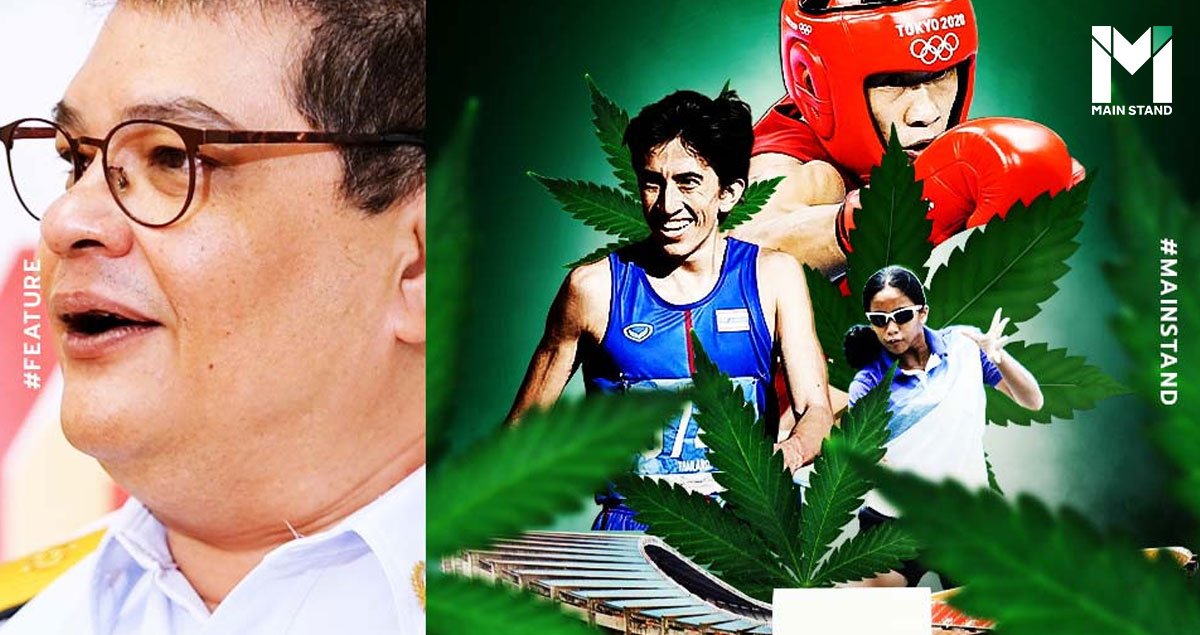
On June 9, 2022, after many years of campaigning, marijuana and hemp were officially legalized in Thailand.
While cannabis is officially decriminalized, its use is still being debated, and research on its advantages and disadvantages is still being conducted. The use of marijuana, therefore, is still closely observed and regulated. For example, recreational use is only permitted in private or in designated areas.
Like in other fields, cannabis legalization is also controversial in sports. According to recent studies, cannabis (specifically CBD) has practical use in sports due to its pain-relieving qualities. However, THC, another component in cannabis, is prohibited by the World Anti-Doping Agency (WADA).
With the aforementioned concerns, are Thai athletes actually ‘allowed’ to use cannabis?
To better understand cannabis, as well as the regulations and suggestions for its use, we contacted Dr. Meechai Inwood, director at the Doping Control Agency of Thailand (DCAT) in order to understand his perspective on the use of cannabis in Thai sport in the future.
Does marijuana use benefit athletes, now that it is no longer illegal?
For about ten years, many in the sports field have agreed that it can be employed. However, the concern over THC should be taken into consideration. Many believe that the drug can ruin athletes’ future, and is not worth the health risks. On top of that, athletes can only enjoy their careers and participate in major tournaments for short periods. After retiring from the sport, one does not need to worry about using the drug for medicinal purposes. Still, diseases that can be cured by cannabis are the ones that do not allow people to continue their sports careers, at least at a professional level.
Although many athletes do not experience any adverse effects of the drug, it is yet to be confirmed whether it should be used because of insufficient data. For example, some chemical compounds in cannabis increase the heart rate. Whether it is advantageous or disadvantageous depends on the type of sport. Some sports require concentration and calmness, so such a benefit could become an obstacle instead.
With respect to recreational use, it is commonly known that marijuana helps alleviate pain and relieve stress at some point. Keep in mind that what is used for medical purposes is CBD (cannabidiol), not THC (Tetrahydrocannabinol).

What is the difference between CDB and THC?
Each species of cannabis contains THC and another 1,000 chemical compounds. Speaking of compounds in cannabis, in general people think of “cannabinoid” which has an effect on the nervous system, whether as a sedative or a stimulant depending on the amount. The drug also poses a danger to the heart, accelerating the heart rate and expanding the trachea. In case of suppression, some will have a ‘foggy brain’ while others will be excessively active, depending upon the amount of time and usage.
The difference between THC and CBD is that THC is a psychoactive drug that results in a withdrawal symptom, unlike CBD. That’s why only CDB is used for medical purposes.
Does it mean CBD is useful?
Around 7-8 diseases are allowed to be cured using cannabis, yielding few bearable side effects. One has to understand all drugs have side effects. For example, paracetamol can destroy the liver in case of overuse.
Patients who suffer stress and take medicines that pose negative effects will turn to CBD instead because it is not psychoactive. Prescriptions from professionals are required so the drug can be used or possessed like other medicines. Doctors view the use of cannabis as a treatment just like any other, such as using turmeric to relieve bloating or kariyat (green chiretta) to reduce fever.
What sports are “suitable” or “not suitable” for the use of cannabis?
The existing data on cannabis comes mostly from Canada and the US and claims that it is not recommended for any sports which require speed and strength. This is because it leads athletes to have increased pulse rates and be more prone to tiredness. Likewise, in sports which require concentration and slow heart rates, such as shooting and archery, the use of cannabis is not advisable because it contributes to increased heart rates.
On the contrary, marijuana is beneficial for sports using large amounts of oxygen in a short time because it helps expand the trachea. According to the statistics, athletes have used the drug as a sedative before competing. The use of cannabis in extreme sports, such as surfing, is not against the rules. However, it is prohibited in some sports.

How much dosage is viewed as doping?
Doping is defined by three criteria. First, a substance boosts athletic performance, providing them strength and speed and preventing tiredness. The second is about whether the drug has adverse effects on the body. Last but not least, taking a drug is considered doping if it is against the spirit of the sport or against fair play.
Diving deeper into THC and CBD, the former is banned during competitions, meaning that the use of such a compound outside of competitions is allowed. Still, THC lasts long in the body, even up to a month in case of constant use, because it is lipophilic and can be stored as fat and gradually released. If the drug is detected, it is viewed as a violation of the rules, even if an athlete has quit using the substance.
There is no ban on consuming CBD. However, it is rare that the only component extracted (from recreational cannabis) is CBD. THC is often unavoidably mixed, and if even small amounts of THC are detected, it is considered an act of doping.
It is acceptable if the drug is used to help promote sleep, relieve stress, and soothe pain. However, it is necessary that one quit taking the drug a month prior to the competition, which is the approximate time the compound lasts.
Are there any other recreational options for athletes apart from marijuana?
The option depends on the purpose of use. For instance, in order to relieve stress, one should be aware of what the cause of the stress is and fix it without the use of cannabis. In case of aching, it needs to be examined whether the problem area is bones, muscles, or ligaments. If proper treatments are applied, the use of cannabis can be ignored.
Forms of relaxation vary, such as abstaining from excessive practice, being exposed to psychological knowledge, listening to music, meditating, having enough sleep, staying relaxed, and playing sports properly. Notwithstanding those practices, stress is inevitable when an athlete is competing at a high level.
To relieve pain, cannabis is sometimes used as a replacement for morphine. Still, there are plenty of other painkillers available for use. Most symptoms deal with physical pain, ranging from injuries and bruises to broken bones, and there are medicines exclusively dealing with these symptoms. Also, those medicines are clinically proven to yield controllable side effects.

Would the consumption of cannabis ever be necessary? If so, what should an athlete do in that circumstance?
Cannabis is never really “necessary” in sport. However, there are some exceptions under which banned substances can be employed.
An exception can be made if the athlete is allergic to the alternative (unbanned) medication, and the substance can’t be replaced by any other drug. For example, if the use of morphine leads an athlete to have a foggy brain, be unable to move, and have trouble breathing, the use of cannabis may be permitted. However, one first has to consult an expert about appropriate dosage, frequency of use, and duration. Then, the following step would be a thorough examination to ensure that no drugs other than marijuana can be used for treatment. Medical certificates and documents by physicians are required.
Lastly, it can be allowed if the banned substance doesn’t affect an athlete’s performance. However, upon considering the three criteria, it seems unlikely that an exception would be made for cannabis use because there are other drugs available.
Is it possible that marijuana can be used in sports to a greater extent in the future?
Owing to insufficient data, it is yet to be known whether cannabis will be used in a freer manner in the course of time. Among over 200 Olympics nations, the nations where marijuana is banned outnumber the ones where marijuana is permitted. As the majority do not agree with the use of cannabis, it will definitely remain prohibited.
However, it is quite possible that future studies will lead to cannabis being removed from the prohibited list, once it has been commonly used for an extended period of time. For example, caffeine was once considered a doping substance because of its ability to stimulate the nervous system. However, it is no longer banned because its effect lasts only 15 minutes. To yield an obvious effect, 12 cups of coffee in one sitting are needed.
Every substance is discussed annually. However, the discussion over cannabis cannot be concluded by this year, as the matter requires more reconsideration. When the drug is legalized, there should be more studies. Scientists will discuss the issue, and could potentially come to the conclusion that there is no need to ban the substance.

How should Thai athletes adapt if cannabis restrictions are further loosened in the future?
When the laws and regulations around cannabis are finalized, it will be clear whether the use is legal or illegal. Upon enforcement, it will be confirmed whether or not cannabis can be used in sports. However, the existing information is not enough to determine what is proper or improper.
Without a universal rule, we can only judge case by case and are unable to give answers to overall issues. Simply put, if you would like to produce energy drinks, which is still illegal, you need to make sure you are able to extract 100% CBD so that it is not against the regulations. It is ambiguous indeed, so it could only be judged whether it is acceptable case by case for the time being.
In summary, are Thai athletes “allowed” to use cannabis?
Athletes are, of course, given the right to use marijuana outside competition, as per the rules of the country they live in.
However, the use of cannabis in sports is still risky. Users need to weigh the potential health risks and the threat of being sanctioned and banned for four years. They have to make their own calls because they are given the right as citizens, and telling them not to use the drug is a violation of this right.
Athletes should consider both their nation’s laws and the rules of their competition, and decide on their own whether they will use cannabis or not. If they use banned substances that are against the rules, they deserve punishment.






